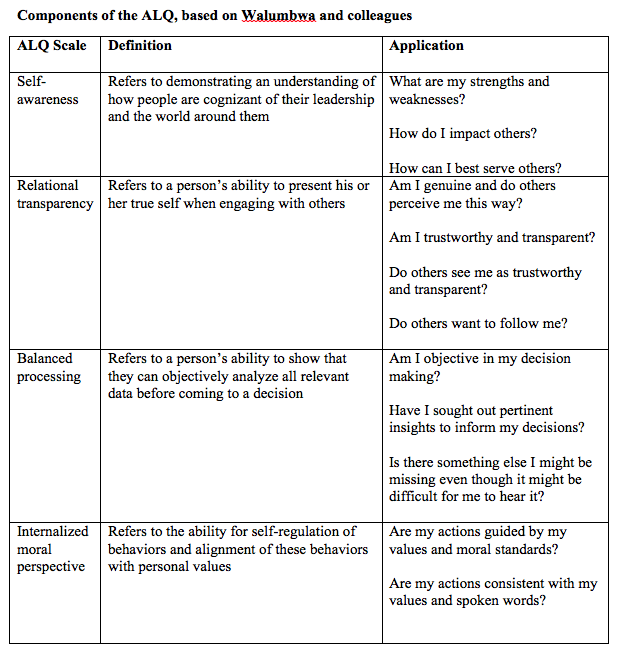In 2013 alone, U.S. organizations spent more than $15 billion on leadership development activities. Although much of these expenses focus on external programming, including face-to-face workshops, webinars, and e-learning, fewer resources target the internal development of leaders. To maximize sustainable leadership development, emphasis must be given to both external programming and individual improvement.
Experts in the field argue that organizations can more effectively redeploy billions of training resources by focusing on helping leaders mine their regularly scheduled lives for deep insights, feedback, strategies, and solutions. By investing in self-awareness and reflective practices, individuals have a better chance to grow as emotionally capable leaders. This article discusses self-awareness as a means to boost authentic leadership, an emotionally capable positive leadership style, and provides suggestions for enhancing self-awareness.
Self-awareness in authentic leadership
Authentic leadership is a pattern of leader behavior that draws upon and promotes both positive psychological capacities and a positive ethical climate. Elements of this definition are incorporated in the Authentic Leadership Questionnaire (ALQ) developed in 2007 and considered the definitive valid and reliable instrument to measure individual-level authentic leadership.
The ALQ uses four scales to evaluate key components of AL: self-awareness, relational transparency, balanced processing, and internalized moral perspective. (See Components of the ALQ, based on Walumbwa and colleagues.)
Self-awareness, the focus of this article, refers to an individual’s capacity to show an understanding of personal strengths, weaknesses, and impact on others. In addition to being a core element of authentic leadership, self-awareness is a key component of emotional intelligence that contributes to self-regulation and leader effectiveness.
Enhancing self-awareness
Authentic leadership can be developed. To become an authentic leader, however, requires that individuals pursue a journey of self-discovery, self-improvement, reflection, and renewal. The following recommendations offer direction for building self-awareness in your authentic leadership development journey.
Explore personal strengths and fatal flaws.
Understanding personal strengths helps to maximize potential. Although it’s your strengths that likely got you noticed as a leader, it may not be your strengths that will keep you on track. For this reason, it’s important to also recognize your major weaknesses or fatal flaws so you can minimize these and prevent them from derailing your leadership.
Completing the Strengths Finder instrument and reading about Goldsmith’s identified fatal flaws can help emphasize personal strengths without ignoring major weaknesses. Goldsmith defines fatal flaws as bad behaviors and cites examples of career derailing behaviors such as making destructive comments, withholding information, and claiming undeserved credit.
Understand your limitations and seek others to complement you and the team.
Self-awareness includes understanding personal limitations and acknowledging what still needs to be learned. Self-awareness also involves recognizing the strengths and fatal flaws in others to build a high performing team where all members complement each other and maximize the whole.
Examine emotional intelligence.
Emotional intelligence (EI) refers to people’s ability to recognize and understand their emotions and those of others. With EI, individuals can use their emotional awareness to manage personal behavior and relationships. EI has four distinctive components that need development: self-awareness, self-management, social awareness, and relationship management.
To better understand where you rate on the various EI scales, complete the simple and inexpensive Emotional Intelligence 2.0 instrument. Taking into account results of the assessment as well as suggestions for improvement can guide a personal AL development plan to develop EI.
Observe yourself and engage an observational partner.
Taking the time to record your major decisions along with the rationale for those decisions provides for personal analysis. In looking at the outcomes of decisions, you can establish a personal feedback loop that reveals what went well, what could be done better, and what patterns of behavior may be fruitful or counterproductive.
Including a trusted colleague or coach as an observational partner can offer just-in-time advice or retrospective validation with constructive direction. When leaders ask for input, it’s most beneficial for them to listen to feedback without justifying their actions or retaliating against the invited messenger.
Create down time for daily reflection.
Taking planned down time in the course of a busy schedule helps clear the mind and provide balanced perspective. This activity can involve taking a daily walk, engaging in mindfulness meditation, or reading daily scripture. Reflective down time is needed to enhance self-awareness and to cultivate authenticity.
Dig deep to gain insight.
It’s important for current and aspiring leaders to be able to ask and answer important questions such as: Who am I? What are my values? What is my purpose? What drives me? Are my actions consistent with what I value? How do others see me and is this consistent with how I wish to be seen?
Digging deep to honestly explore these questions requires time, dedication, and possibly validation from others. This type of deep reflection represents the inner work of leadership development that someone else cannot do for you.
Keep a reflective journal.
Keeping a journal helps to record personal thoughts that can lead to a higher degree of self-awareness and enhance both writing and emotional fluency. In recording daily reflections, this can help to recognize desirable as well as undesirable patterns of emotions and behavior that could either be repeated or modified for self-improvement.
A reflective journal also helps you begin to compose your individual life story, which can shed light on where you have come from, how you have learned from experiences, and provide direction for the future you wish to pursue.
Incorporate time for personal renewal and celebrate milestones.
Taking time to celebrate milestones is important for closure as well as for personal renewal. Pausing at regular intervals can be both inspiring and energizing for yourself and the team you lead.
Authentic leadership journey
Authentic leadership begins with self-awareness. Growing in self-awareness, however, entails individual responsibility, hard work, and devotion to reflective practices. You can use the suggestions in this article to build self-awareness that in turn enhances a personal authentic leadership development journey.
Selected references
Bradberry T, Greaves J. Emotional Intelligence 2.0. San Diego, CA: Talent Smart; 2009.
Giulioni JW. Developing leaders: Turning life into learning. September 11, 2014. http://smartblogs.com/leadership/2014/09/11/developing-leaders-turning-into-learning/?utm_source=brief.
Goldsmith M. What Got You Here Won’t Get You There. New York, NY: Hyperion; 2007.
Rath T. Strengths Finder 2.0. New York, NY: Gallup Press; 2007
Walumbwa F, Avolio B, Gardner W, et al. Authentic leadership development and validation of a theory-based measure. Management Department Faculty Publications. Paper 24. 2008.
Maria R. Shirey is a professor and assistant dean for clinical and global partnerships at the University of Alabama at Birmingham School of Nursing.




















1 Comment.
As an RN who is interested in ways to improve my practice, I found this article was relevant and timely to all nurses seeking to cultivate the leadership skills needed in our profession. I am writing you because I wanted to personally thank you for printing a useful article to foster both the growth of our colleagues and myself. I felt this article resonated with personal and professional values we share in nursing. The content that Shirey conveys provides practical application of self-awareness through multiple tools. She gives tips to assist nurses at every level to evaluate their decisions. All of these tips enable the nurse to learn the implementation of quality leadership. I appreciate that the publication included introspection and self-care for the nurse, along with the “permission” to acknowledge our limitations while seeking team members with needed skills to fill in those gaps. I feel that nurses will evolve using the skills encouraged by the author.
Further research on this topic and personal experience confirmed the insight that Shirey submitted regarding the facets of self-awareness and leadership in nursing. Starting with the professional nursing associations, both the NLN and AACN promote that leadership is a defining attribute of nursing. According to the NLN in 2012, being a leader with critical thinking skills is a characteristic of being a Baccalaureate-educated nurse. The AACN in 2008 also acknowledges roles that a nurse will fill—“leadership and scholarship in improving care, synthesis of theories and clinical experience, evaluator of outcomes, and communication skills across disciplines. Knowing that leadership is a key part of nursing, it is a professional responsibility to develop those traits.
Reviewing literature, I found two studies that echoed Shirey’s article. One was on nursing students developing leadership skills, and another focused on listening skills and nursing leadership. In the 2015 study, Waite affirmed that “self-awareness develops leadership capacity.” Waite focused on understanding one’s psychologically “preferred and non-preferred styles” to direct strengthening of non-preferred style and take advantage of strengths in the preferred style. Ms. Debbie Fitzgerald of Regent University, in 2009, wrote a dissertation documenting the positive effects of listening skills and communication in nursing leadership.
At work, I knew a manager who embodied the attributes of a self-aware leader. She had identified her strengths and capitalized on them. She was dynamic and creative while following sound clinical practice. Using skills and talents of motivation, support, and teaching; she directed those around her in an organized fashion. She was personable and approachable; always finding and encouraging the best traits in others to promote cohesive teamwork. She had educated herself and learned the clinical role well, continually improving her practice. Knowing and observing this manager gave me a positive model to reflect on.
Nurses are leaders of health– promoting positive change for individuals and groups. This positive change often begins with oneself, then flows to the people surrounding the initiator of change. Shirey’s article of being self-aware provides a clear path to growth of the professional nurse as a leader. The additional research and experience I provided confirm the assertions. By assessing oneself, acknowledging and addressing feedback, listening, following good role models, implementing theory and evidence (including those provided by Shirey), and evaluating the outcomes; nurses will be confident in the approach to grow continually in their careers.
Thank you for the inspiration to become a better leader.
Sincerely,
Melissa Stephenson, RN